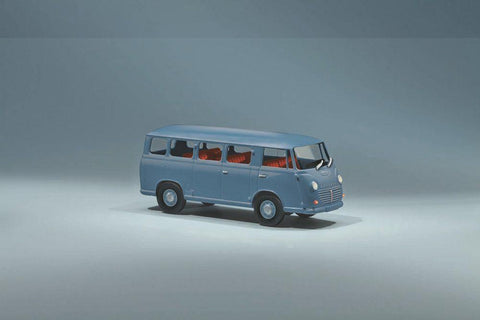
Busch 94100 Blue Goliath Express 1100 Station Wagon
Goliath Express 1100Carl FW Borgward founded his well-known car empire in Bremen in the early 1920s.After initially producing coolers and fenders on behalf of the Hansa-Lloyd-Werke, he developed and built his first own delivery van under the name Goliath with the three-wheeled lightning cart from 1924.Because of the great popularity, further three-wheel delivery vans followed, whose success story continued across various models well into the post-war era.Already in 1927 the development of the first four-wheel delivery van of the Goliath brand followed, which was followed by six other models in the weight classes 0.5 - 1.5 t until 1938.However, these are only known to a few connoisseurs of the brand today.In 1938, the production of all Goliath vans had to be stopped due to the type restrictions imposed by the Schell plan.It wasnt until eleven years later that vehicle production was resumed with the launch of the GD 750 tricycle.1951 was followed by the first attempt to gain a foothold in the four-wheel van market again with the GV 800.This model was structurally based on the GD 750.However, he was denied a major success due to defects in the construction, so that production was discontinued in 1953.At this point, the completely newly developed Goliath Express was already ready for sale and was able to succeed seamlessly.It had a very modern construction for its time and also an extraordinarily beautiful external appearance.Initially, various two-stroke engines from the Goliath car range served as the drive.From 1957, four-stroke engines were used for the first time, as a result of which the vehicle was given the additional designation 1100 based on the new engine size.This four-stroke engine, like many other components, also came from the Goliath car range at the time.Parts of the chassis, the oil pressure brake, but also the extremely attractive brown Bakelite dashboard of the passenger car models were used.This brought a touch of driving quality and luxury into the rather dreary day at the delivery van.But that found its expression in a relatively high sales price, which even exceeded that of the legendary VW Transporter.The unusual pricing policy, the strong competition (here in particular through the VW Transporter, but also through the DKW Schnelllaster, the Ford FK and the Tempo Rapid / Matador) and the discoloration of the negative images of the now frowned upon cheap Unfortunately, delivery van also denied this Goliath four-wheel delivery van great success.When economic problems began to emerge in the Borgward Group in 1960, attempts were made to give the beautiful Express a new impetus from the autumn of the year.From then on, it was marketed under the higher-quality name Borgward Express 1100.With the Borgward bankruptcy the production of the Goliath Express 1100 finally ended in Bremen in 1961. Although the vehicle was not only offered in Germany, but also exported to other European countries and even overseas, only a manageable total production of 1953-1961 was produced approx.14,000 vehicles.Versions were initially available ex works as panel vans, station wagons, high platforms and low platforms.This was followed later by an exceptionally beautiful variant as a luxury bus with the VW Samba paroli, with a large folding sunroof and a generous roof edge glazing.In addition to the standard models, the Goliath plant also manufactured a few special vehicles, including ambulances and THW multi-purpose vehicles.And, as was common practice at the time, the company also supplied completely drivable chassis, including the drivers cab, to various body construction companies.Special vehicles with z.B. box or sales superstructures, but also funeral cars, beverage delivery vans and as a single model even a small articulated truck.A few Goliath Express 1100 have survived the times and are now carefully maintained by dedicated friends of the brand.In the course of the research, one or the other garage door was kindly opened to us.The original vehicles and the countless original documents provided by Goliath friends then served us as valuable templates for the development of our 1:87 models.In model construction and tool making, we placed great emphasis on a detailed and true-to-scale reproduction of the vehicles special features.On closer inspection, the models from the finely crafted radiator grille to the brown bakelite dashboard and the original size on the side of the tire show many lovely details.It is worth going exploring the model with your eyes.The DreiKa model series for the Goliath Express 1100 begins with the two versions of panel van and station wagon. As a result, further model variants of the Goliath Express 1100 are implemented in 1:87 scale, so that over the course of time the entire range that can be delivered ex works and perhaps also one or the other special construction can travel to the collectors showcases in a reduced form.
94100
